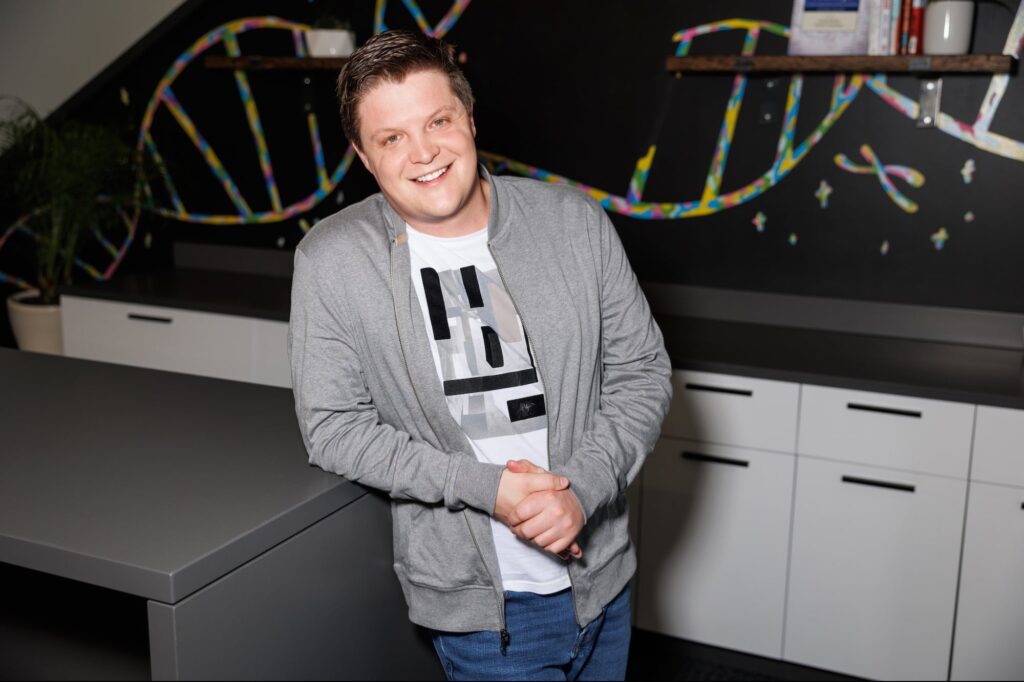Today, Joshua Britton is the founder and CEO of Debut, a biotechnology company delivering “high-performing” cosmetic bioactive ingredients “at unprecedented speed.” But before the startup began to innovate in the biotech space, it was just an idea, one that stemmed from “some academic research,” “a lucky Uber ride” and a “vision for the beauty industry,” Britton says.
Image Credit: Courtesy of Debut. Joshua Britton.
Britton completed his Ph.D. in biochemistry and organic chemistry before furthering his studies at MIT. Afterward, he decided to apply what he’d learned to “this new thing called cell-free and synthetic biology,” which refers to the processes within biotechnology that enable the creation or modification of biological organisms. Essentially, enzymes or microbes can be “taught” how to make powerful ingredients — including plant or flower molecules — in a reactor in a lab setting.
Naturally, the process comes with massive implications for the multi-billion-dollar beauty industry, which relies on natural ingredients for fragrance and other properties. Britton decided it was time to bring the biotech mainstream. But, of course, he also needed to fund the venture. He had a side hustle driving for Uber at night to earn some extra cash, but when he got to talking with one passenger and pitched her his idea, she was sold — and wrote him a $100,000 check to support his efforts.
Related: The Future Is…Fungi?: This Biotech Company Transforms Mushrooms Into Luxury Materials Used by Hermès
Britton’s passenger would be Debut’s first investor, but certainly not its last: The company raised $22.6 million in a Series A round led by Material Impact in 2021 and $34 million in a Series B round led by BOLD, the venture capital fund of L’Oréal, the world’s largest cosmetics company, last year.
“Whenever people want [fragrance] products, they have to effectively use agriculture to get them.”
Debut has already brought the technology to market with a consumer skincare brand called Deinde, which targets inflammaging, a process associated with the aging of the human body. The products contain Naringenin, a potent polyphenol typically found in grapefruit peel that’s been clinically proven to strengthen the skin barrier and reduce inflammation. According to Britton, the clinical claims allow for “product differentiation in market,” and many brands are coming to Debut as they seek to convert from other mainstays like Vitamin C, niacinamide and squalane.
But fragrance will be Debut’s next frontier, a move that coincides with growing consumer demand for transparency and natural ingredients — and concerns over the beauty industry’s impact on dwindling natural resources. The majority of fragrance ingredients from fragrance houses are cultivated, perhaps from the “from the lavender fields of France” or the roots of a certain type of tree, Britton says, which requires land, water and agrochemical use.
Related: Jeans Made Out of…What? One Company Dared to Go Where None Had Before — and Even Levi’s Is On Board.
“Whenever people want these products, they have to effectively use agriculture to get them,” Britton explains. “The fragrance industry has been very good at hiding the fact that the majority of fragrances are actually chemically derived. If you dig pretty deep into them, you’ll find that they’re made from petroleum-based synthesis. And that’s just what we’re looking to change.”
“There could be 200 or 300 compounds in there all at different levels. And you have to be able to mimic that exactly in a bioreactor.”
When it comes to fragrance, Debut is all about “mimicking nature.” Sometimes, that means mirroring a single ingredient, a process that’s not unlike making wine or beer, where a watery, sugary solution is mixed with a cell, but instead of producing wine or beer, it produces a fragrance model, Britton explains. It’s a method that involves limited land use, no agrochemicals and “very little waste.”
Of course, some scents “are very complex mixtures” that require a careful balance of different notes — and Debut has developed the technology to replicate those as well, Britton says. “The nose is so sensitive that if you have a fragrance from a root, for example, what you’ll see is there could be 200 or 300 compounds in there all at different levels,” he explains. “And you have to be able to mimic that exactly in a bioreactor. If you [don’t], then you won’t have the same smell, and the product won’t be successful.”
Related: The Future of Food: How Biotech Will Save Us All
Debut is all about putting successful products in the hands of consumers — foregoing biotech’s standard horizontal integration model, whereby companies seek out a scientific solution that’s then produced at a very small scale for a vertical one that emphasizes the end consumer and product from the start, according to Britton.
“When we think about how to bring synthetic biology to people, it’s in the form of tangible products,” Britton says. “That means that we have to not only do groundbreaking research but also interact with our consumers and users. We have to understand how to make formulations. We have to make physical products.”
Read the full article here











